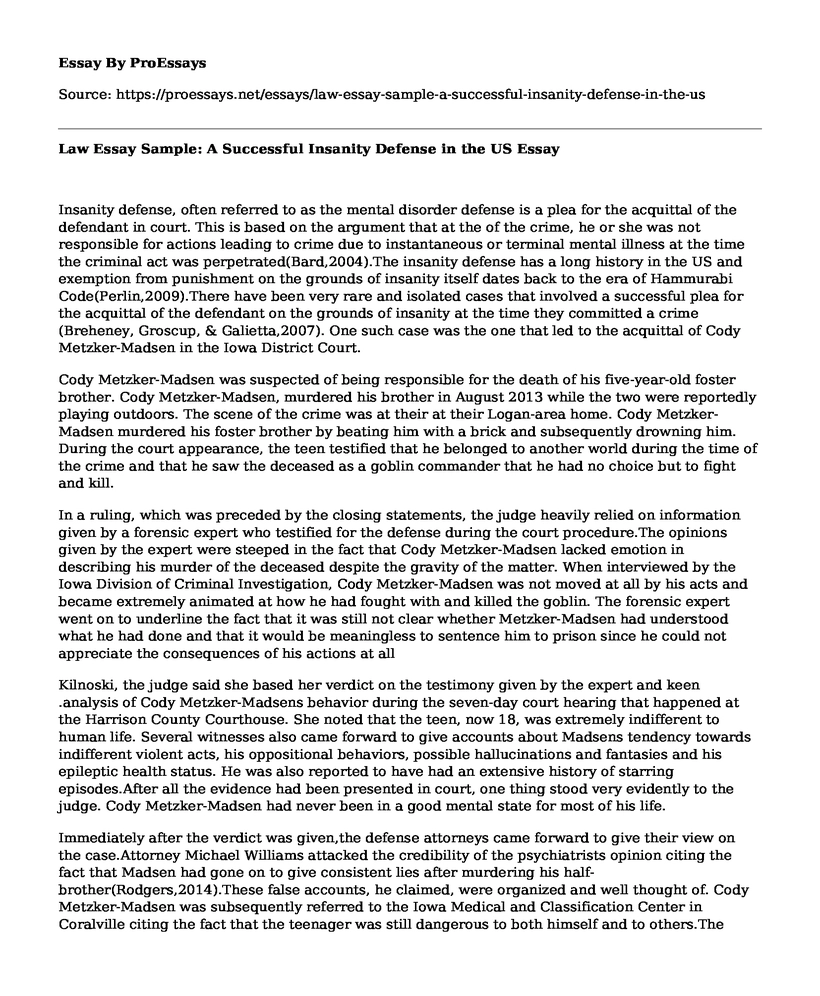Insanity defense, often referred to as the mental disorder defense is a plea for the acquittal of the defendant in court. This is based on the argument that at the of the crime, he or she was not responsible for actions leading to crime due to instantaneous or terminal mental illness at the time the criminal act was perpetrated(Bard,2004).The insanity defense has a long history in the US and exemption from punishment on the grounds of insanity itself dates back to the era of Hammurabi Code(Perlin,2009).There have been very rare and isolated cases that involved a successful plea for the acquittal of the defendant on the grounds of insanity at the time they committed a crime (Breheney, Groscup, & Galietta,2007). One such case was the one that led to the acquittal of Cody Metzker-Madsen in the Iowa District Court.
Cody Metzker-Madsen was suspected of being responsible for the death of his five-year-old foster brother. Cody Metzker-Madsen, murdered his brother in August 2013 while the two were reportedly playing outdoors. The scene of the crime was at their at their Logan-area home. Cody Metzker-Madsen murdered his foster brother by beating him with a brick and subsequently drowning him. During the court appearance, the teen testified that he belonged to another world during the time of the crime and that he saw the deceased as a goblin commander that he had no choice but to fight and kill.
In a ruling, which was preceded by the closing statements, the judge heavily relied on information given by a forensic expert who testified for the defense during the court procedure.The opinions given by the expert were steeped in the fact that Cody Metzker-Madsen lacked emotion in describing his murder of the deceased despite the gravity of the matter. When interviewed by the Iowa Division of Criminal Investigation, Cody Metzker-Madsen was not moved at all by his acts and became extremely animated at how he had fought with and killed the goblin. The forensic expert went on to underline the fact that it was still not clear whether Metzker-Madsen had understood what he had done and that it would be meaningless to sentence him to prison since he could not appreciate the consequences of his actions at all
Kilnoski, the judge said she based her verdict on the testimony given by the expert and keen .analysis of Cody Metzker-Madsens behavior during the seven-day court hearing that happened at the Harrison County Courthouse. She noted that the teen, now 18, was extremely indifferent to human life. Several witnesses also came forward to give accounts about Madsens tendency towards indifferent violent acts, his oppositional behaviors, possible hallucinations and fantasies and his epileptic health status. He was also reported to have had an extensive history of starring episodes.After all the evidence had been presented in court, one thing stood very evidently to the judge. Cody Metzker-Madsen had never been in a good mental state for most of his life.
Immediately after the verdict was given,the defense attorneys came forward to give their view on the case.Attorney Michael Williams attacked the credibility of the psychiatrists opinion citing the fact that Madsen had gone on to give consistent lies after murdering his half-brother(Rodgers,2014).These false accounts, he claimed, were organized and well thought of. Cody Metzker-Madsen was subsequently referred to the Iowa Medical and Classification Center in Coralville citing the fact that the teenager was still dangerous to both himself and to others.The murdered boys mother shed tears after the verdict and claimed that justice had been denied after the verdict was given and the case closed.
References
Bard, J. S. (2004). Re-Arranging Deck Chairs on the Titanic: Why the Incarceration of Individuals with Serious Mental Illness Violates Public Health, Ethical, and Constitutional Principles and Therefore Cannnot Be Made Right by Piecemeal Changes to the Insanity Defense. Hous. J. Health L. & Pol'y, 5, 1.
Breheney, C., Groscup, J., & Galietta, M. (2007). Gender matters in the insanity defense. Law & Psychol. Rev., 31, 93.
Rodgers, G. (2014, November 08). Teen found not guilty by reason of insanity. Retrieved February 07, 2018, from https://www.desmoinesregister.com/story/news/crime-and-courts/2014/11/07/cody-metzker-madsen-first-degree-murder-not-guilty-insanity/18645809/
Perlin, M. L. (2009). His Brain Has Been Mismanaged with Great Skill: How Will Jurors Respond to Neuroimaging Testimony in Insanity Defense Cases. Akron L. Rev., 42, 885.
Cite this page
Law Essay Sample: A Successful Insanity Defense in the US. (2021, Sep 02). Retrieved from https://proessays.net/essays/law-essay-sample-a-successful-insanity-defense-in-the-us
If you are the original author of this essay and no longer wish to have it published on the ProEssays website, please click below to request its removal:
- Personality Disorder of Frankie in Frankie and Alice Movie Analysis
- What Do Member States Do to Come Up With a Robust Criminal Justice System?
- Argumentative Essay on the Importance of Ethnic Heritage to Identity
- Essay Sample on Alternatives to Imprisonment: A Solution to High Incarceration Rates
- Essay Sample on The Three Components of Personality: Id, Ego, Superego
- Essay Example on Truth in Social Sciences: A Critical Analysis
- Women's Sickness: Impact of Fundamental Family Levels on Emotions - Essay Sample







